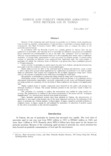Because of the continuing and rapid increase in pesticide use in Taiwan, much attention has been focused on pesticide contamination of food and effect of pesticides on human health and the environment. The Plant Protection Center (PPC) conducts tests to evaluate the safety of the pesticides used in Taiwan.
In accordance with the Pesticide Control Act, waiting periods for harvest after the last application of pesticides, and tolerance level of pesticides for different crop groups are established before pesticides are recommended for use in the field. The "tolerance" level of pesticides for different crop groupings was determined based on 1) the acceptable daily intake value of individual pesticides, 2) average daily consumption of each crop group by Chinese people, 3) actual residue content of pesticides on different crops estimated from supervised trials. The total number of pesticides for which the tolerance levels of different crop groups have been established amounts to 79 approximately.
Acute toxicity of pesticides to useful insects has also been studied, and special attention has been paid to the two predators of the rice brown planthopper.
Paddy fields account for 60% of the cultivated land in Taiwan and therefore, acute toxicity to fish is taken into account when applications for registration of pesticides to be used in paddy fields are submitted. Fish toxicity was evaluated by the so-called "dangerous rating value" which refers to the amount of pesticides in the field water exceeding the TLM value.
Mutagenicity of pesticides is continuously being tested by using Ame's microbial method.
Nationwide surveys of residual levels of pesticides which are known to be pollutants such as chlorinated hydrocarbon insecticides, mercurial compounds in soil, water and biological samples are being carried out constantly. So far the levels of these residues do not appear to be significantly high.
Higher residual levels of arsenic compounds were detected in the paddy soil samples from different localities of Taiwan. The arsenic derivates present in the soil were found to limit the growth of rice.
The potential of a pesticide to pollute the environment was studied by using model ecosystems. The distribution of residues in the various components of the system and the «ecological magnification" of a chemical were derived from model ecosystems.
Since intensive agricultural systems have been adopted in Taiwan, the phytotoxicity of pesticides to non target crops became one of the most important factors for the evaluation of the safety of pesticide use. Criteria include: 1) direct injury, 2) injury caused by pesticide pollution of irrigation water, 3) injury caused by soil polluted by pesticides, 4) reduction of growth caused by the effect of pesticides on the soil microorganisms.

